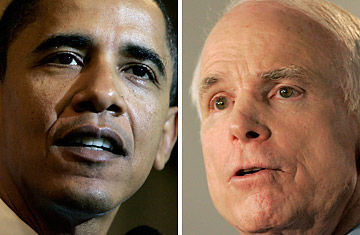
Presidential candidates Barack Obama and John McCain
In case anyone missed it, the general election started in earnest this week. And it was President Bush, of all people, who fired the starting gun, from 5,000 miles away.
With Bush's approval ratings hovering at all-time lows of 27%, Republican nominee John McCain knows all too well that his best shot for winning the presidency in the fall is distancing himself from the current occupant of the Oval Office. But after the fallout from the President's appeasement attack on Barack Obama during a speech in Israel, it's clear that will be easier said than done. In that one speech, in which the President seemed to equate Obama and Democrats with Nazi appeasers for allegedly wanting to "negotiate with terrorists and radicals", Bush did what no one else has yet been able to: unite the Democratic Party, including Hillary Clinton, Nancy Pelosi, and Harry Reid, behind Obama.
It didn't take long for Obama to seize the opportunity to tie McCain to Bush on everything from the failed Middle East peace process, to the six-year war in Iraq and the rise of Iran. "If George Bush and John McCain want a have a debate about protecting the United States of America, that's a debate I'm happy to have ... and that's a debate that I will win, because George Bush and John McCain have a lot to answer for," Obama told an audience in Watertown, South Dakota on Friday. "Both Bush and McCain represent the failed foreign policy and fear mongering of the past."
Obama hardly mentioned McCain on his own, referring to "Bush and John McCain" more than a dozen times in his remarks, underlining his campaign's strategy of casting a McCain presidency as a Bush third term. The White House, following Bush's speech, said the President was not referring to Obama — who has said in the past that he would engage in direct talks with the leaders of hostile nations such as Iran and North Korea, though has repeatedly said he would not meet with terrorist groups such as Hamas and Hizballah. But if it wasn't him and the Democrats, Obama said to reporters in South Dakota, whom was Bush referring to — "Some straw man...?"
But while Bush may not have named Obama, McCain showed no such restraint. On Thursday afternoon, McCain claimed Obama was "unfit" to be commander-in-chief because of his willingness to negotiate with terrorists, and called on him to explain why he'd meet with Iranian President Mahmoud Ahmadinejad, "a man who is the head of a government that is a state sponsor of terrorism, that is responsible for the killing of brave young Americans, that wants to wipe Israel off the map, who denies the Holocaust."
The McCain campaign repeated its criticisms after Obama's remarks Friday, calling the speech a "hysterical diatribe." In a speech before the National Rifle Association late in the day, McCain said, "I have some news for Senator Obama: Talking, not even with soaring rhetoric, in unconditional meetings with the man who calls Israel a 'stinking corpse' and arms terrorist who kill Americans will not convince Iran to give up its nuclear program...It would be a wonderful thing if we lived in a world where we don't have enemies. But that is not the world we live in, and until Senator Obama understands that reality, the American people have every reason to doubt whether he has the strength, judgment, and determination to keep us safe."
Obama had used his remarks to try to blunt such a line of attack, pointing to statements this week by Bush Defense Secretary Robert Gates suggesting that he thinks direct talks with Iran are long overdue, along with previous assertions by 9/11 Commission Chairman Lee Hamilton and former Secretaries of State James Baker and Colin Powell in support of talks with Iran. "All this shows that President Bush, who is no student of history, has never learned the lesson of how to deal with those that disagree with us, said Karl Inderfurth, a political science professor at George Washington University. "He has chosen to isolate them, to stigmatize them. If John McCain is going to adopt that as his own, then he is going to be further isolated from the mainstream of U.S. foreign policy in the post-World War II period."
The flare-up came at an unfortunate time for McCain, who had planned to use this week to highlight his commitment to fighting global warming and his openness to a more civil, bipartisan politics as a way to draw a sharp distinction with the White House. But in opting to appeal to the party's conservative base by echoing Bush's sentiment, McCain may have compounded the problem. "McCain had an opportunity to put some distance between himself and Bush on foreign policy and he failed to do so," said Thomas Mann, a presidential scholar at the Brookings Institution. "It's a lost opportunity."
For McCain and Obama, it was just the latest in a series of tit-for-tat exchanges over foreign policy. McCain and surrogates such as Connecticut Senator Joseph Lieberman have done their best to link Obama to Hamas after a Hamas official endorsed Obama's candidacy. Obama has condemned the endorsement and repeated his stance that he would not negotiate with the Palestinian group.
By the end of the week, even the White House seemed to recognize what a mess it had made with Bush's speech. "We did not anticipate that it would be taken that way, because it's kind of hard to take it that way when you look at the actual words," said Ed Gillespie, White House counselor. Privately, Administration officials have acknowledged that Bush's remarks were targeted at Obama and the Dems. But if the White House really didn't expect the outcry that would follow, John McCain may have an even bigger challenge this fall than he realizes.
